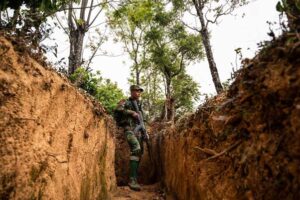
Civil Society, Crime & Justice, Democracy, Featured, Headlines, International Justice, North America, TerraViva United Nations
–
CIVICUS discusses the recent US Supreme Court ruling on presidential immunity and its potential impact on the 5 November presidential election with Ciara Torres-Spelliscy, a professor of Law at Stetson University College of Law.
 On 1 July, the US Supreme Court ruled that presidents have absolute immunity for the exercise of their core constitutional powers and are entitled to a presumption of immunity for other official acts, although they don’t enjoy immunity for unofficial acts. The decision comes as Donald Trump faces criminal charges for trying to overturn his 2020 election loss to Joe Biden. The question now is whether Trump’s actions will be considered official or unofficial. But it’s unlikely he’ll be tried before the election, and if he returns as president he could pardon himself. Critics claim the Supreme Court ruling violates the spirit of the US Constitution by placing the president above the law.
On 1 July, the US Supreme Court ruled that presidents have absolute immunity for the exercise of their core constitutional powers and are entitled to a presumption of immunity for other official acts, although they don’t enjoy immunity for unofficial acts. The decision comes as Donald Trump faces criminal charges for trying to overturn his 2020 election loss to Joe Biden. The question now is whether Trump’s actions will be considered official or unofficial. But it’s unlikely he’ll be tried before the election, and if he returns as president he could pardon himself. Critics claim the Supreme Court ruling violates the spirit of the US Constitution by placing the president above the law.
What are the main points of the Supreme Court ruling on presidential immunity?
This is a ruling in the federal case against Trump for trying to overturn his loss to Biden in the 2020 election. He is accused of pressuring state officials to overturn the results, spreading lies about voter fraud and using the Capitol riot of 6 January 2021 to delay Biden’s certification and stay in power. Trump pleaded not guilty and asked the US Supreme Court to dismiss the entire case, arguing that he was acting in his role as president and was therefore immune from prosecution.
The Supreme Court didn’t do that, but instead created three new categories of presidential immunity: complete immunity for official acts involving core constitutional powers, potential immunity for acts within the ‘outer perimeter’ of official duties and no immunity for private, unofficial acts.
The key question now is whether Trump’s actions will be deemed official, giving him immunity, or unofficial, leaving him open to prosecution. This is the first case of its kind, as Trump is the first American president to be prosecuted.
How does this ruling affect Trump’s other criminal cases?
This immunity ruling is likely to delay all four of his criminal cases, as judges will have to apply these new rules and drop any charges that involve the use of core presidential powers, as these can no longer be used as evidence against him.
As well as being accused of trying to overturn his 2020 defeat, Trump is also accused of paying adult film actress Stormy Daniels hush money during the 2016 election and not properly accounting for it in his business records. This case is unlikely to be affected by the ruling, as his actions don’t involve either core or peripheral presidential powers. Judge Merchan will have to decide whether any of his 34 felony business fraud convictions will stand or be thrown out.
But some of his other crimes occurred during his time in the Oval Office. Trump is accused of conspiring to overturn his 2020 loss in Georgia by asking the state’s top election official to ‘find 11,780 votes’. Trump has pleaded not guilty and could be prosecuted in his personal capacity, as presidents have no role in administering US elections. As in the Capitol case, this was a private action he took as a candidate and it would be difficult to fit into the category of presidential immunity.
The fourth case Trump faces is the Mar-a-Lago classified documents case. Trump is accused of mishandling classified documents by taking them to his Mar-a-Lago residence after leaving office and refusing to return them to the National Archives when he could no longer lawfully possess them. As his alleged crimes took place when he was no longer president, this case shouldn’t be affected by the immunity ruling. However, he could argue he possessed the documents while in office and ask that his case be treated differently from other defendants. This case was dismissed by Judge Cannon. However, the Mar-a-Lago criminal case could come back to life if the 11th Circuit reverses her dismissal.
What are the broader implications of this case for the presidential election?
After this decision, the American public should think about the consequences of who they elect as president, because the presidency can become a wellspring of crime.
An honest president wouldn’t be affected by the Trump v. US decision, because an honest person doesn’t need criminal immunity. Only time will tell whether the Supreme Court has invited future presidents to go on a crime spree. But what is certain is that only US voters can keep criminals out of the White House. So, as I write in my new book, Corporatocracy, the stakes in the 2024 election are incredibly high for the fate of US democracy.
Civic space in the USA is rated ‘narrowed’ by the CIVICUS Monitor.




 In June, thousands of women took to the streets of São Paulo and other cities to protest against a bill that would classify abortion after 22 weeks as homicide, punishable by six to 20 years in prison. Protests began when the lower house of Congress fast-tracked the bill, limiting debate. Abortion is currently legal in Brazil only in cases of rape, foetal malformation or danger to the life of a pregnant person. The proposed bill, promoted by evangelical representatives, would criminalise people who have abortions more severely than rapists. Public reaction has slowed down the bill’s progress and its future is now uncertain.
In June, thousands of women took to the streets of São Paulo and other cities to protest against a bill that would classify abortion after 22 weeks as homicide, punishable by six to 20 years in prison. Protests began when the lower house of Congress fast-tracked the bill, limiting debate. Abortion is currently legal in Brazil only in cases of rape, foetal malformation or danger to the life of a pregnant person. The proposed bill, promoted by evangelical representatives, would criminalise people who have abortions more severely than rapists. Public reaction has slowed down the bill’s progress and its future is now uncertain.





